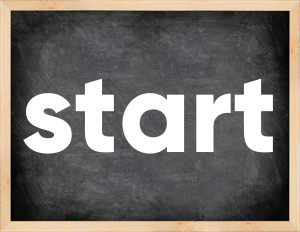 The English verb 'start' is pronounced as [stɑːt].
The English verb 'start' is pronounced as [stɑːt].
Related to:
regular verbs.
3 forms of verb start: Infinitive (start), Past Simple - (started), Past Participle - (started).
Here are the past tense forms of the verb start
👉 Forms of verb start in future and past simple and past participle.
❓ What is the past tense of start.
Start: Past, Present, and Participle Forms
| Base Form | Past Simple | Past Participle |
|---|---|---|
| start [stɑːt] |
started [stɑːtid] |
started [stɑːtid] |
What are the 2nd and 3rd forms of the verb start?
🎓 What are the past simple, future simple, present perfect, past perfect, and future perfect forms of the base form (infinitive) 'start'?
Learn the three forms of the English verb 'start'
- the first form (V1) is 'start' used in present simple and future simple tenses.
- the second form (V2) is 'started' used in past simple tense.
- the third form (V3) is 'started' used in present perfect and past perfect tenses.
What are the past tense and past participle of start?
The past tense and past participle of start are: start in past simple is started, and past participle is started.
What is the past tense of start?
The past tense of the verb "start" is "started", and the past participle is "started".
Verb Tenses
Past simple — start in past simple started
(V2).
Future simple — start in future simple is start (will + V1).
Present Perfect — start in present perfect tense is
started
(have/has + V3).
Past Perfect — start in past perfect tense is
started
(had + V3).
start regular or irregular verb?
👉 Is 'start' a regular or irregular verb? The verb 'start' is regular verb.
Examples of Verb start in Sentences
- The movie starts at 7.20 (Present Simple)
- Have you started doing your last homework? (Present Perfect)
- They started to bother us at least every week (Past Simple)
- My car isn't starting, could you take a look? (Present Continuous)
- Aren't you starting a new life? (Present Continuous)
- At least start doing something and you will see the result (Present Simple)
- Will you start working for him? (Future Simple)
- He is not here to start a fight, he wants to help (Present Simple)
- Robert's started a whole thing, so ask him first (Past Simple)
- The project will start next year (Future Simple)